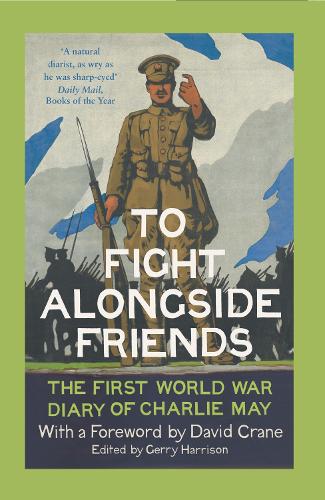
To Fight Alongside Friends: The First World War Diary of Charlie May
(Paperback)
Publishing Details
To Fight Alongside Friends: The First World War Diary of Charlie May
By (Author) Gerry Harrison
Foreword by David Crane
HarperCollins Publishers
William Collins
5th November 2015
United Kingdom
Classifications
General
Non Fiction
Autobiography: historical, political and military
First World War
European history
940.4272092
Physical Properties
Paperback
304
Width 129mm, Height 198mm, Spine 20mm
220g
Description
The First World War Diaries of Manchester Pals Captain Charlie May written and kept in secret and published now for the first time. A born storyteller, Charlie Mays vivid eye for detail and warm good humour brings his experience in the trenches (and the experience of millions of ordinary men like him) to life for a 21st-century readership.
Captain Charlie May was killed, aged 27, in the early morning of 1st July 1916, leading the men of B Company, 22nd Manchester Service Battalion (the Manchester Pals) into action on the first day of the Somme.
This tolerant and immensely likeable man had been born in New Zealand and against Kings regulations he kept a diary in seven small, wallet-sized pocket books. A journalist before the war and a born storyteller, Mays diaries give a vivid picture of battalion life in and behind the trenches during the build-up to the greatest battle fought by a British army and are filled with the friendships and tensions, the home-sickness, frustrations, delays and endless postponements, the fog of ignorance, the combination of boredom and terror to which every man that has ever fought could testify.
His diaries reflect on the progress of the war, tell jokes good and bad, give details of horse-rides along the Somme valley, afternoons with a fishing rod, lunch in Amiens, a gastronomic celebration of Christmas 1915 and concerts in Whiz Bang Hall. He describes battles not just with the enemy, but with rats, crows and on the makeshift football pitch all recorded with a freshness that brings these stories home as if for the first time.
The diaries are also written as an extended and deeply-moving love letter to his wife Maude and baby daughter Pauline. I do not want to die, he wrote Not that I mind for myself. If it be that I am to go, I am ready. But the thought that I may never see you or our darling baby again turns my bowels to water.
Fresh, eloquent and warm, these diaries were kept secret from the censor and were delivered to his wife after his death by a fellow soldier in Charlies company. Edited by his great-nephew and published for the first time, these diaries give an unforgettable account of the war that took Charlie Mays life, and millions of others like him.
Reviews
May proved to be a natural diarist, as wry as he was sharp-eyed Daily Mail, Books of the Year
What shines through like sunshine is Charlie Mays default belief in service to country, his quiet commitment to others over self, and his sheer decency. You could bet your life on Charlie. And, in a way, we did The Times
Captain Mays words offer a rare and vivid insight into life in the trenches: of rats and death, and the mens optimism as they prepared to go into battle. They also read as a moving love letter to the wife he adored and the little girl he couldnt wait to be reunited with Daily Express
Sensitive and bright May is a gifted storyteller and his uncensored diary makes for fine reading Daily Mail
[We] want to hear the voices of those who were there, unencumbered by 21st century prejudices To Fight Alongside Friends [is] the disarmingly jaunty, previously unpublished diaries of Captain Charlie May beautifully edited and minutely annotated Sunday Times
Reflective and acute By July 1st 1916, when the last diary entry was entered at 5.45am, the reader feels that they know Charlie May, and what follows comes as a shock, as if a cinema reel had broken in mid-reel [the diaries] linger in the memory [and] deserve to be made available to a wider audience. They testify to how the 1914 generation drew on literary expression to order and to mediate what is commonly supposed to have been an incommunicably dreadful experience Financial Times
Every so often one comes across a diary where it is the sense of personality behind it that lift it out of the ordinary: such a diary is that of Captain Charlie May David Crane
The diary of Captain Charlie May provides a fascinating insight into the mind of a young British officer. It is peppered with intriguing insights, acute observations and the hectic, heart-stopping flurries of nocturnal trench raids
Robin Cross, author of the bestselling VE-Day
Author Bio
Born in India, Gerry Harrison returned to England for his education. Leaving school, and to fulfil a passion, he became an actor, before following a rewarding career on the production side of feature films. He has since worked for as a producer for Channel Four, BBC and ITV, and then as a councillor for twelve years. Meanwhile he has written pieces for the Guardian and the Times, and the Irish Times. He is the author of The Scattering, a history of post-war Irish emigration to north London, and is currently completing a biography of legendary BBC radio producer and communist Reggie Smith. He lives in Ireland. Charlie May was Gerry Harrisons great uncle, and Harrisons father was Mays Godson. When he was bequeathed his diaries in 2005, Harrison deposited them in the Regimental Museum in Manchester for the benefit of other researchers and writers, after which they moved to the Imperial War Museum. The diaries have never before been published as a whole.
